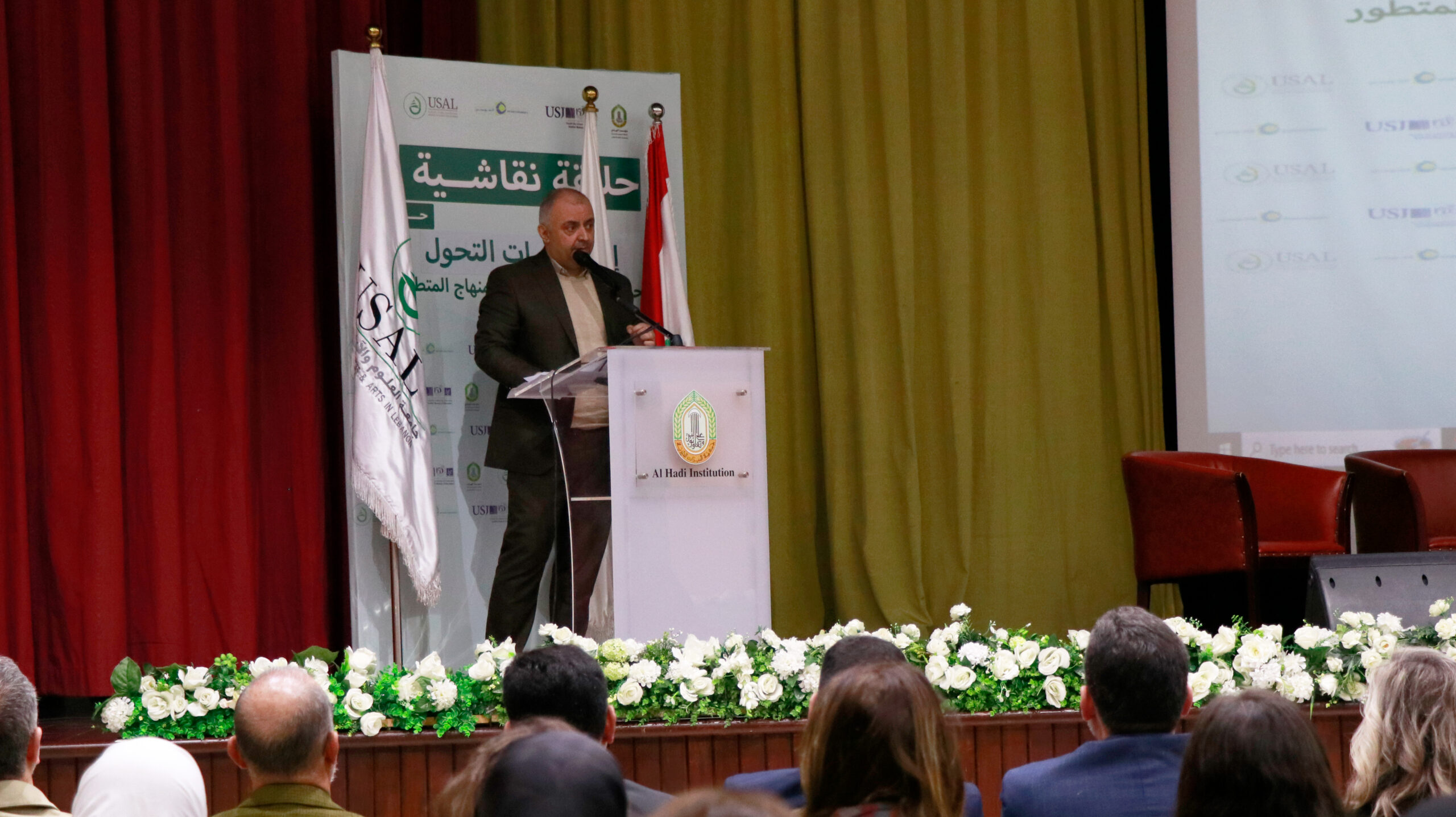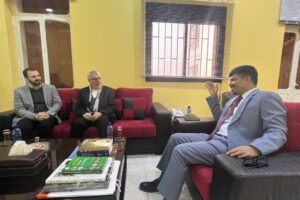USAL organized a panel discussion about “The Strategies of Transitioning towards an Inclusive School in a Developed Curriculum”
- Posted by USAL
- Date January 31, 2024

The Faculty of Education at the University of Sciences and Arts in Lebanon organized a panel discussion about “The Strategies of Transitioning towards an Inclusive School in a Developed Curriculum”, in collaboration with the Lebanese Institute for Educators (ILE) at Saint Joseph University, the Syndicate of Special Education Teachers in Lebanon and Al Hadi Institute for the Deaf, Blind and Learning Disabilities.
Participants in this discussion panel were professor Hiyam Eshak, head of the Educational Center for Research & Development; Dr Walid Hammoud, Dean of the Faculty of Education, and Curriculum Development Coordinator at USAL; Mr. Jihad Saliba, General Coordinator of the new National Academic Curriculum development process; Dr Hilda El Khoury, the director of counselling and guidance at the Ministry of Education; Dr. Asma Mjaes Azar, the head of Syndicate of Special Education Teachers in Lebanon; Dr Shaza Ismail, the director of the Educational Inclusion Program at Al Mabarrat Association; Dr Nidal Jouni, Lebanon’s delegate at the World Council for Gifted and Talented Children and lecturer at the American University of Beirut; Dr Vivian Bou Sarie, lecturer at Saint Joseph University; Dr Micheline Aoun, the coordinator at the Psychological Assessment and Intervention Center; Rabih Baalbaki, the head of EdTech Syndicate in Lebanon; Shaikh Ismail El Zein, the manager of Al Hadi Institute. In presence were also researchers and academics from different Lebanese universities, in addition to representatives of public and private schools, representatives of Lebanese and international social organizations, representatives of educational centers and university students.
Shaikh Ismail El Zein
The event began with the Lebanese national anthem, after which a speech was delivered by the manager of Al Hadi Institute who stated that: “This discussion panel is an important turning point in inclusive education that has always been a national demand that urges the society to care for this marginalized group, and to seek their educational and social integration”.
Shaikh El Zein added that the: “Government must conduct a study in completion to this transition, aiming at establishing early intervention centers to provide guidance and awareness for families of disabled children. These centers must also provide services for children from birth till the age of three years old: starting from diagnosis, family intervention and providing appropriate specialists, thus developing health, therapeutic and rehabilitation programs, in addition to developmental skills, preparing them for integration in their societies and schools”.
The manager of Al Hadi Institute called for “providing intervention and assessment in the field of developmental skills within the developed curricula, to ensure a secure future for teaching disabled children”. He also called for “developing flexible curricula in conformity with the severity of each student’s disability, and adopting specific standards to transition them towards vocational education or training” stressing that “the necessary equipment must be available to make the most suitable decisions”. El Zein asked whether new school books will be convenient for disabled students.
Hiyam Eshak
Professor Hiyam Eshak delivered a speech next, stating that the invitation to this discussion panel is timely, for it illustrates the principles on which the strategy for transitioning towards an inclusive school was built in the paper on inclusive education, prepared by specialists in the Center for Educational Research and Development.
Eshak added that this “support paper determined the standards of inclusive schools,” stating that the first standard is to recognize the responsibility of teaching each learner in accordance with their respective diverse needs, the second one being to receive all learners and provide them with a supportive environment, and the third is to change rules, regulations, structures, procedures and practices until all learners receive their education”.
She noted that “the paper has also determined the inclusive educational approaches which are: Universal Design for Learning, Multi-Tiered System of Supports, International Classification of Functioning, Disability and Health. It also specified the procedural approaches for active learning and its strategies, including differentiated instruction, experiential learning, inquiry-based learning, collaborative learning, service-based learning, problem-based learning and participatory education”, adding that the paper included as well the applicable standards of Universal Design for Learning, namely reinforcing all learners’ access to education, increasing their participation in the learning process and providing them with the necessary educational and instructional support”.
Eshak emphasized that: “the basic principles underlying the Universal Design for Learning, taking into account individual differences among learners are: providing multiple means for engagement, representation, action and expression” adding that “the support paper did not fail to determine the characteristics of an inclusive curriculum, being: flexible, safe, equitable, inclusive, collaborative, innovative, proactive and allowing learners to feel affiliated. It also set an inclusive education policy for gifted and talented children, outlining the characteristics of Comprehensive Enrichment Curriculum and Academic Acceleration Program”.
Dr Walid Hammoud
Dr Walid Hammoud then delivered a speech saying that “The support paper presents a critical question related to the strategies that shall impact transitioning to inclusive schools on several levels including procedural approaches, implementation mechanisms, registration, intervention and assessment, focusing on its definition and vision of an inclusive curriculum. It has also considered the position of gifted and talented students within the inclusive school, emphasizing the importance of providing a safe environment that is welcoming for all learners regardless of their educational needs”.
Dr Hammoud posed a question about “the role of institutions concerned with students with special needs, and their relation to inclusive schools (Hub Schools), which are expected to house additional resources enabling them to receive learners with severe disabilities” asking whether its will be possible to reconcile the Universal Design for Learning with the multilevel support system, and to implement this design in conformity with the Lebanese context”.
Mr. Jihad Saliba
On his part, Mr. Jihad Saliba stressed on the “importance of adopting the principle of the basic right to education and the social duty towards every learner, otherwise we will remain in a system of privilege.”
He added: “Inclusion is a right and a duty, not a luxury or a privilege. It is a social and educational identity that includes acceptance, confrontation, assistance, overcoming, and excellence”, asking: “How can we work today to redesign and maintain a new curriculum that does not take into account the values of acceptance, confrontation, assistance, overcoming, and excellence?”
The Discussion Panel
Following the opening speeches, the discussion panel was held, moderated by Dr Nidal Jouni. The participants included Dr Hilda El Khoury, Dr. Asma Mjaes Azar, Dr Vivian Bou Sarie, Dr Micheline Aoun, and Dr Shaza Ismail.
Previous post




